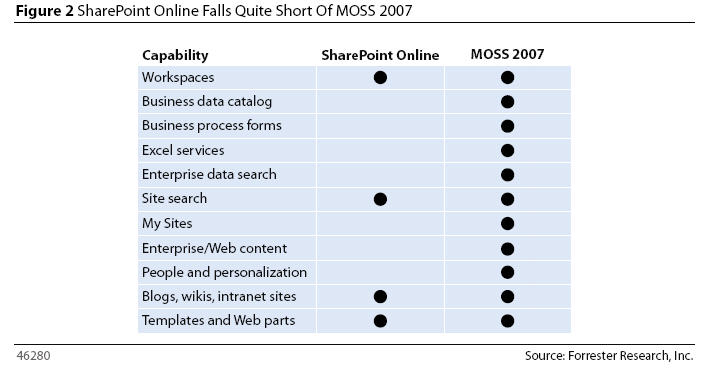What does 'SharePoint in the cloud' really mean?

Microsoft began shipping, starting November 17, the final version of its Exchange Online and SharePoint Online Microsoft-hosted services. Are these products full versions of Microsoft's enterprise software running in "in the cloud"? The short answer: No.
Microsoft's growing family of Online services are a key component of the company's Software + Services strategy. Microsoft has said that it plans to make available all of its enterprise software products as hosted services. The final version of Communications Server Online (the Microsoft-hosted Office Communication Server) is due out in 2009, officials said today, as are hosted versions of Microsoft's security infrastructure and management solutions. (My guess is this means Forefront Online and System Center Online.)
Customers of all sizes -- from largest enterprises to single-person shops -- can buy these hosted services from Microsoft and about 1,500 partners who've signed up to resell them. Microsoft says it already has sold 500,000 seats of Exchange Online, which customers are deploying starting today.
These new Microsoft Online services currently run on servers in Microsoft's datacenters. They do not (yet) run on top of Microsoft's Azure cloud operating system platform; Microsoft hasn't provided a timetable as to when they will and how/if this will have any impact on these services, in terms of performance, reliability or availability.
Microsoft officials are touting customers' ability to run these hosted services on their own services in their own datacenters, but so far haven't said when this option will be available.
Update: A Microsoft spokeswoman said my understanding here was incorrect and that Microsoft will not allow users to run SharePoint Online or any other of its Online services in their own datacenters. Microsoft is offering users three Software+Service deployment options: on-premise software-only (SharePoint Server running on a customer's systems at their own facilities); Microsoft-hosted (SharePoint Online); or partner-hosted (Hosted SharePoint). That's it.
This is somewhat surprising to me, given that Microsoft is touting Azure's virtualization functionality as enabling users to have more deployment options. From a Microsoft official, cited in a new blog entry on Virtualization Review:
"In the future, Windows Azure Services Platform will allow customers to run Windows Server 2008-based virtual machines in the cloud and move Windows Server virtual machines back and forth between cloud and on-premise servers. Currently, Windows Azure Services Platform does not support customers uploading virtual machines containing any version of Windows Server."
Meanwhile, back to SharePoint Online....Microsoft is pushing cost- and energy-saving messages as reasons customers might be interested in its Online services. Company officials are telling users they can save 10 percent in IT costs by running the hosted version of these services vs. the software-only equivalents, and up to 50 percent if they replace "legacy systems" with Microsoft Online offerings. Microsoft also is offering users a service-level agreement guaranteeing 99.9 percent up-time of these new Microsoft-hosted services. The hosted version of Microsoft's Online services typically run about $15 per month per user.
As Forrester Research noted earlier this year, however, SharePoint Online is not simply a the hosted version of SharePoint Server. A number of SharePoint Server's capabilites and features are not offered to users if they take the hosted approach. Examples: The business data catalog, use of Excel services and enterprise data search. Check out this Forrester table (from a July 2008 SharePoint research note) for the more complete comparison:
For some users, this stripped-down feature set is no doubt worth the cost savings. Others -- who aren't ready to entrust Microsoft (or any cloud vendor, for that matter) with their data -- or who need all the functionality in Exchange, SharePoint, etc., will stick with the software-only versions of these products.
Anyone out there looking hard at Exchange Online, SharePoint Online, etc.? What are the plusses and minuses, in your book?
